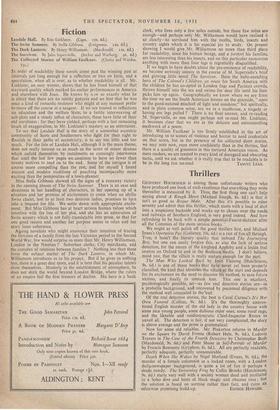Thrillers
GEOFFREY HOUSEHOLD ;s among those unfortunate writers who have produced one book of such excellence that everything they write thereafter is measured by it. Thus, the first thing one can't help saying about A Rough Shoot (Michael Joseph, 8s. 6d.) is that it isn't as good as Rogue Male. After this it's possible to relax severity and admit that this thriller, which starts with a load of shot into a suspicious backside and works up to chases over the roads and railways of Southern England, is very good indeed. And how refreshing to be back with a simple potential-Fascist-dictator after all the Commies of the more serious books. '
We might as well polish off the good thrillers first, and Michael Innes's Operation Pax (Gollancz, 10s. 6d.) is a riot of fun all through. True, it hasn't the literary quality that imbued The Journeying Boy, but one can easily forgive this, as also the lack of serious detection, for the return of the knighted Appleby and a locale that centres on Oxford to end in the Bodleian vaults. I don't believe, mind you, that the villain is really mature enough for the part. The Man Who Looked Back by Joan Fleming (Hutchinson, 9s. 6d.) is one of those books that have never yet been properly classified, the kind that identifies the villain at the start and depends for its excitement on the need to discover his method, to save future victims, and finally to unmask him. This one is excellent, psychologically possible, set—as few real detective stories are—in a probable background, and uncovered by piecemeal diligence with • the method well concealed to theend.
Of the real detective stories, the best is Carol Carnac's It's Her Own Funeral (Collins, 9s. 6d.). It's the thoroughly conven..
tional English murder of the old lady in the country house with some nice young people, some dubious older ones, some rural rage, and the likeable and unidiosyncratic Chief-Inspector Rivers to unveil all. The detection is fair, if not very complicated, the story is above average and the prose is grammatical.
Now for some old reliables. Mr. Pinkerton returns in Murder on the Square by David Frome (Robert Hale, 9s. 6d.), Ludovie
Travers in The Case of the Fourth Detective by Christopher Bush (Macdonald, 9s. 6d.) and Peter Shane in Self-Portrait of Murder by Francis Bonnamy (Gryphon, 8s. 6d.). All are perfectly readable, perfectly adequate, perfectly unmemorable. Death When She Wakes by Nigel Morland (Evans, 9s. 6d.), the murder of a female columnist in a locked room, with a London dailyrnewspaper background, is quite a lot pf fun if 'perhaps a shade rowdy. The Swimming Frog by Collin Brooks (Hutchinson. 9s. 6d.) starts very well with a society woman dead and mutilated in a Soho dive and hints of black magic and obscene rites ; but the solution is based on surmise rather than fact, and ruins an














































































 Previous page
Previous page